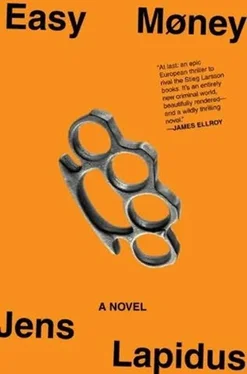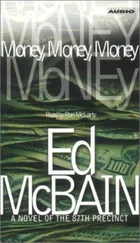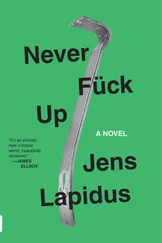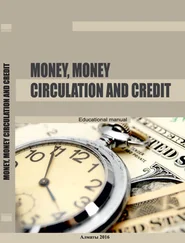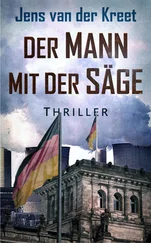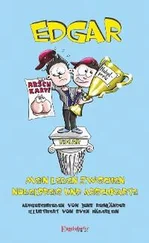At the same time, he felt contempt. His parents were clueless. Where he came from-it just didn’t cut it.
And he’d brought a new lead home with him: Camilla’s guy’d been a Yugo. What did that mean? That was probably information he should give to the police.
But were the police finding anything? JW’d provided them with the Jan Brunéus story, the teacher who’d obviously used his sister. Why didn’t they call? Didn’t they give a fuck about the Westlund family’s anxiety and grief?
At the same time, it was such a relief to have handed it all over to the police. He could do other things. He couldn’t let Camilla take too much of his concentration; he had to focus on his career.
JW learned about money laundering. The key to success was moving money from one economic system to another. Moving from dirty to clean areas of business. Moving in a cycle. Moving in three vital steps: placement, concealment, laundry. Without them, the circle wasn’t complete.
Placement was necessary since you were dealing in cash. No C sales, no matter how posh the people, happened through any other payment method. Catchy phrase: Cash is king for cocaine consumers. The advantage of cash: left no trace. The disadvantage: It was suspicious. People raised their eyebrows at fat rolls of big bills. The cash had to be moved. Placed. Converted. Into another currency, into electronic ones and zeros in a bank account, into stocks, options, or other financial instruments. Into something that didn’t attract attention, that wasn’t easy to maneuver, that was one step away from your illegal source of income.
The second move was all about concealment. Use businesses as a front or use other methods that would conceal the source of income: bank accounts in countries with good confidentiality policies. You had to break the chain. Create layers of transactions. Couldn’t show where the money’d come from. Use decoys. Use numbered accounts. Use systems that cut your connection to the sweet sums.
The final move was the most important; it regarded the actual laundering, the reintegration of the money into your finances. When the cash’d been placed, been put into accounts, the money concealed and impossible to trace back to you, it was time for the final step-the focus on where it’d come from, the creation of a chimera of legitimate sources. Often taxed sources. Normal sources.
Money laundering forced you to play by the rules of the state. You lost the sweet flexibility of cold, hard cash. Entered it into the financial system, where everything was meticulously regulated. All information was saved. All assets were checked off on lists. Every move was registered. No assets arise out of thin air. But it’s possible to fake it.
You want to do some laundry. You want to break the chain. At the same time, you want to create a good-looking chain to show the authorities. There are two alternatives. One, you put the money somewhere where the confidentiality laws stop Big Brother’s investigations in their tracks. The answer to probing questions: There is a registered transaction, but, unfortunately, there is no authority to release it. Or you use the system itself to create a trail. The answer you offer Big Brother: Of course there’s a registered transaction. Look here.
The whole thing demanded preparation. JW was going to get that BMW, no question about it. Registered and insured. Time was of the essence. He wanted to get going right away.
A week later, he’d bought three shelf companies online for six thousand kronor each. Registered himself as a director. One was an events-marketing company; the other two dealt in antiques. Perfect. He placed share capital of one hundred thousand in each company by creating promissory notes. He made himself the debtor-a way to avoid actually investing any real money. He wrote up a hiring contract with himself in the events-marketing firm. Finally, he named the companies: JW Empire Antiques I, Ltd., JW Empire Antiques II, Ltd., and JW Consulting, Ltd. Sounded professional enough.
He got in touch with people in London, friends of Fredrik and Putte who studied at the London School of Economics. Creamy kids whose parents dropped 100,000 kronor per semester for a fine education. They knew others there who were already working, investment bankers. JW made calls. Nasal upper-class voices on the other end of the line. Guys who worked day and night and tried to legitimize their own self-image. He always referred to the guys he’d gotten their names from. That opened doors. Led to new names. Brits, Indians, Italians. Half the world worked in London.
Finally, after four days of calling London-his phone bill would probably land upward of three grand-he was able to speak to a man at the Central Union Bank, Isle of Man. A tax paradise with one huge advantage: bank secrecy. Perfect.
They agreed to meet during the same week that JW was in London with Abdulkarim.
That night, JW was going to have dinner with Sophie at Aubergine on Linnégatan.
He was at home in his room, surfing the Web. Drooling over buyable gadgets. Überhot cars. Used Excel to calculate his own purchases as of late. New sales methods. Cash-flow analysis. Laundering advantages.
Shut down the computer.
Got up. It was time to see Sophie. JW rocked his usual look: Gucci jeans, loafers, blue striped Pal Zileri shirt with double cuffs. He put on the cashmere coat.
Walked toward Aubergine. Dirty snow lined the streets. His shoes were more slippery than a banana dipped in K-Y. He saw Sophie through the window. She always looked good, always. But you couldn’t appreciate it 100 percent while she was sitting down. When he walked in, she stood up. Her hotness hit him in the face like a rock-hard right jab. Shit, she was fine.
She was wearing tight blue jeans, Sass & Bide, pointy black shoes, and a low-cut black top, probably from the Nathalie Schuterman boutique on Birger Jarlsgatan. Sophie was a regular.
He winked, fake-flirted with her.
She smiled. They hugged. A quick kiss.
JW sat down. Ordered a beer. Sophie was already nursing a glass of red.
The restaurant was shaped like an L. The windows were big. The black lacquered tables discreet. The bar was located in the corner of the L. Intricate iron structures suspended from the ceiling served as lamps, casting a soft light over the room.
The clientele consisted of lawyers and finance guys grabbing an after-work beer, club-scene gals pouting over preparty cocktails, and Östermalm couples out for dinner, tête-à-tête.
They ordered food.
JW put his arm around Sophie.
She sipped her wine. “You look tired.”
Sometimes she had a way about her that made him nervous. When she fixed her gaze, she never looked away.
“I don’t think I’ve been sleeping enough.”
“But last week you told me you were tired ’cause you’d been sleeping too much. You’d slept till three in the afternoon. Is that a record for you?”
JW ran his finger along the frosted beer glass. “I don’t think so. That was the weekend I got back from Mom and Dad’s. You get drowsy from sleeping too much. I relaxed too much at their house.”
“That stuff’s so weird. There’s, like, always a reason to be tired. Can be totally opposing things. Kind of messed up, when you think about it. You’re tired ’cause you’ve slept too little, or too much, from the winter darkness, or from the spring light. People say you get tired from vegging out one day or from being too active another.”
“It’s true. Everyone wants an excuse to be tired. Tired ’cause you had a hard workout at the gym or ’cause you bent your mind all out of shape for an exam. Tired ’cause it’s too hot or ’cause the cold takes it out of you. People always have a reason to be tired. But I know why I’m, like, falling asleep right now. I went out last night.”
Читать дальше
